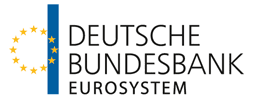

Deutsche Bundesbank
Taunusanlage 5, 60329 Frankfurt/Main, Germany

Motivation
Artificial intelligence is at the centre of attention in politics and among the general public. Its transformative potential is altering companies, markets, and the functioning of our economy. At the same time, the associated risks should not be underestimated. Amidst these changes, it is central banks which face the challenge of performing their central role as guardians of price stability even in times of technological and regulatory change. Rapid progress in the field of artificial intelligence is opening up entirely new possibilities for economic analysis and a new depth of economic insight.
Against this backdrop, the Deutsche Bundesbank and SUERF are pleased to co-host a conference on “Artificial Intelligence and the Future of Central Banking” in Frankfurt am Main, Germany on 9th December 2025. Bringing together experts from academia, central banks, and international organisations, the event will feature a keynote address, three sessions on
This conference will provide a unique platform to explore AI’s transformative impact on central banking and foster dialogue on its opportunities and challenges.
You can find conference videos here.
A Brief History of the Future: Data, Text and AI for Smarter Policies
Joachim Nagel, President · Deutsche BundesbankA Brief History of the Future: Data, Text and AI for Smarter Policies
Alvaro Ortiz, Head of Big Data & AI Economic Analysis · BBVA Research presentationForecasting public debt in the euro area using machine learning: decision tools for financial markets
Amélie Barbier-Gauchard and Emmanouil Sofianos, University of Strasbourg presentationDual interpretation of machine learning forecasts
Karin Klieber, European Central Bank (ECB) & SUERF Research Affiliate presentationCo-author(s): Philippe Goulet Coulombe, Maximilian Goebel
Scenario analysis with multivariate Bayesian machine learning models
Anna Stelzer, Oesterreichische Nationalbank presentationCo-author(s): Michael Pfarrhofer
Uncovering disagreement in central bank communication: Social media and monetary policy surprises
Davide Romelli, Trinity College Dublin & SUERF Research Affiliate presentationCo-author(s): Donato Masciandaro, Conor Parle, Matteo Pograxha
Disagreement about fiscal policy
Peter Tillmann, University Giessen presentationCo-author(s): Peter Winker, Albina Latifi, Viktoriia Naboka-Krell
Slow tone: detecting white lie disclosures using response latency
Doron Reichmann, Goethe-Universität Frankfurt presentationCo-author(s): John C. Heater
The labor market effects of generative artificial intelligence
Jonathan Hartley, Stanford University presentationCo-author(s): Filip Jolevski, Vitor Melo, Brendan Moore
The macroeconomic effects of AI innovation
Andrea Giovanni Gazzani, Bank of Italy presentationCo-author(s): Filippo Natoli
Concepts and challenges of measuring production of artificial intelligence in the U.S. economy
Tina Highfill, U.S. Bureau of Economic Analysis presentationCo-author(s): David Wasshausen, Gregory Prunchak